In September, consumers and the dietary supplement industry achieved a major victory in the pursuit of good health. On September 28, 2010, the U.S. Food and Drug Administration (FDA) and a coalition of health practitioners, scientists and manufacturers, including the Alliance for Natural Health (ANH), agreed on the wording for qualified health claims for selenium against various forms of cancer. However, the impact extends well beyond the narrow role of selenium to all nutrients and health. Health claims and qualified health claims serve an extremely important role in communicating science about nutrients to the general public. After all, consumers don’t use dietary supplements merely because they taste good, but rather because they bring health benefits to consumers. After reading some comments from within the industry, it seems as if everyone may not be fully aware of the history behind health claims and their importance.
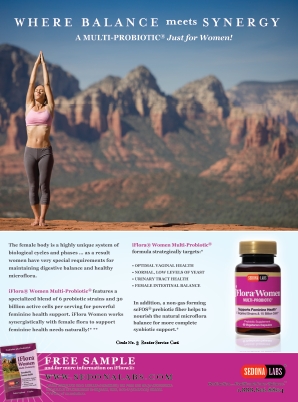 The industry and the grass roots actions of consumers have brought about important congressional actions including the Proxmire Act of 1976, the Nutrition Labeling and Education Act of 1990 (NLEA) and the Dietary Supplement and Education Act of 1994 (DSHEA). It also took court actions against FDA to prevent it from eliminating all dietary supplements except those containing ONLY the recommended dietary allowances (RDA) levels of the basic 11 FDA-recognized vitamins and minerals. We fought those illegal attempts by FDA in the courts in independent actions to prevent the agency’s limitations on safe dosages, the inclusions of nutrients in addition to the 11 accepted by FDA and to have health books in stores. The courts agreed with us that the levels of vitamin A and D we were supplying were safe and legal (1977), that “non-essential” nutrients were not unapproved food additives (1993) and that the sales of health magazines and books were not an “unlawful extension of labeling.” The Nutrition Labeling and Education Act of 1990 and court actions have won our right to health claims and qualified health claims. However, it was the court ruling known as Pearson v. Shalala won by Attorney Jonathan Emord, not anything in the statute, that created the qualified claims regime as a matter of constitutional law. Now, court action has re-established our right to truthful and practical health claims.
The industry and the grass roots actions of consumers have brought about important congressional actions including the Proxmire Act of 1976, the Nutrition Labeling and Education Act of 1990 (NLEA) and the Dietary Supplement and Education Act of 1994 (DSHEA). It also took court actions against FDA to prevent it from eliminating all dietary supplements except those containing ONLY the recommended dietary allowances (RDA) levels of the basic 11 FDA-recognized vitamins and minerals. We fought those illegal attempts by FDA in the courts in independent actions to prevent the agency’s limitations on safe dosages, the inclusions of nutrients in addition to the 11 accepted by FDA and to have health books in stores. The courts agreed with us that the levels of vitamin A and D we were supplying were safe and legal (1977), that “non-essential” nutrients were not unapproved food additives (1993) and that the sales of health magazines and books were not an “unlawful extension of labeling.” The Nutrition Labeling and Education Act of 1990 and court actions have won our right to health claims and qualified health claims. However, it was the court ruling known as Pearson v. Shalala won by Attorney Jonathan Emord, not anything in the statute, that created the qualified claims regime as a matter of constitutional law. Now, court action has re-established our right to truthful and practical health claims.
Let’s review this latest important development with the attorney who made it all possible, Jonathan Emord of Emord and Associates. Many readers are familiar with Attorney Emord, as he has chatted with us in this column about important industry legal issues five times previously.
Attorney Emord has been practicing constitutional and administrative law before the federal courts and agencies since 1985. Having begun his career as an attorney in the Federal Communications Commission during the a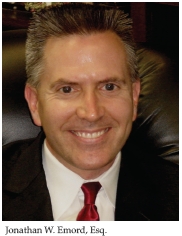 dministration of President Ronald Reagan, Attorney Emord has maintained an abiding conviction to achieve full First Amendment protection for the freedoms of speech and press. In 1991, he authored the critically acclaimed Freedom, Technology, and the First Amendment, in which he chronicled the intellectual foundations of the First Amendment and advocated replacing government control over the airwaves with a title registry, private property rights approach. Attorney Emord has practiced law for several well-respected firms, including Wiley, Rein & Fielding, and served as vice president of the Cato Institute.
dministration of President Ronald Reagan, Attorney Emord has maintained an abiding conviction to achieve full First Amendment protection for the freedoms of speech and press. In 1991, he authored the critically acclaimed Freedom, Technology, and the First Amendment, in which he chronicled the intellectual foundations of the First Amendment and advocated replacing government control over the airwaves with a title registry, private property rights approach. Attorney Emord has practiced law for several well-respected firms, including Wiley, Rein & Fielding, and served as vice president of the Cato Institute.
Attorney Emord practices food and drug law, deceptive advertising law, and libel law, and he served as lead counsel in the Pearson v. Shalala (D.C. Cir. 1999); Pearson v. Shalala (D.D.C. 2001); Pearson v. Thompson (D.D.C. 2001); Whitaker v. Thompson (D.D.C. 2001); Whitaker v. Thompson (D.D.C. 2002); and ANH v. Sebelius (D.D.C. 2010) cases, holding FDA censorship of nutrient–disease relationship claims unconstitutional. He also served as lead counsel in Nutraceutical Corp. v. Crawford (D.Ut.2005). Attorney Emord is admitted to practice in the states of Illinois, Virginia and the District of Columbia. He is admitted to practice before the U.S. Supreme Court ; the U.S. Courts of Appeal for the D.C., Fourth, Seventh, Ninth, and Tenth Circuits; the U.S. Court of International Trade; and the U.S. District Courts for the District of Columbia, Eastern District of Virginia, Northern District of Illinois, and Western District of Wisconsin. He is a member of the Governing Council of the International Society of Regulatory Toxicology and Pharmacology. He is the only nonscientist member and vice-chair of the Certification Board for Nutrition Specialists. He is a 1982 graduate (B.A., Political Science and History) of the University of Illinois, where he was an Edmund J. James Scholar and a 1985 graduate (J.D.) of DePaul University.
Attorney Emord’s professional publications include Freedom, Technology, and the First Amendment (1991), The Rise of Tyranny (2008), Global Censorship of Health Information (2010), “The First Amendment Invalidity of FCC Ownership Regulations” (Catholic University Law Review, 1989), “Contrived Distinctions: The Doctrine of Commercial Speech in First Amendment Jurisprudence” (Cato Institute Policy Analysis, 1991), “The First Amendment Invalidity of FCC Content Regulations” (Notre Dame Journal of Law, Ethics & Public Policy, 1992 ) , “Murder by Medicare: The Demise of Solo and Small Group Medical Practices” (Regulation, 1998), and “Pearson v. Shalala: The Beginning of the End for FDA Speech Suppression” (Journal of Public Policy & Marketing, 2000).
Passwater: Congratulations on the recent victory for qualified health claims in the federal courts. As I understand it, qualified health claims are intended to inform the consumer of the current body of scientific knowledge about a nutrient. Instead of suppressing these facts because it is not proven to a near-conclusive degree (which is rare in nutrition research), it will allow a qualified claim with a disclaimer that alerts the consumer to the fact that the evidence is not yet conclusive. 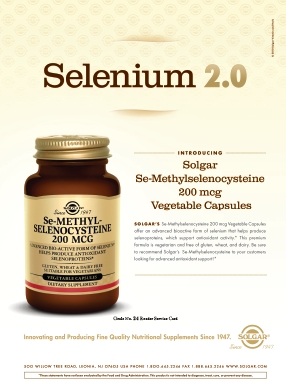
One respected industry leader commented, “This is not a significant change,” suggesting that the importance of this latest victory over FDA censorship may not be fully recognized (1).* Perhaps, industry could benefit from a review of health claims’ importance. First of all, how did health claims come about? Were they part of DSHEA? Wasn’t it one of your previous court victories that allowed health claims and qualified health claims to be made in the first place?
Emord: I cannot overstate the importance of ANH v. Sebelius (2010). Judge Ellen Huvelle brilliantly reaffirmed Pearson v. Shalala (1999) and made clear, for the first time in any federal decision, that FDA cannot lawfully saddle claims with false, misleading or verbose qualifications.
Many in the industry had complained that FDA qualifications were too long and contained false information mandated by FDA. Judge Huvelle held in the case of the selenium qualification that FDA violated the First Amendment by failing to rely on accurate and succinct qualifications. She ruled that FDA had erroneously excluded supportive evidence and filled the qualifications with a biased statement of agency contradiction. She ruled that qualifications had to be accurate and could not contradict the claim. That is a major advance. ANH v. Sebelius is truly an extraordinary victory for free speech.
I also disagree with the additional comment, “You must be careful what you wish for” (1). Those who deserve their liberties fight for them. When our basic liberties are at stake, those who would forego the battles out of fear that wished for results may not materialize concede a loss of rights at the outset without a fight. That self-destructive approach is one that a free people cannot afford. We must never concede a loss of our fundamental rights and, if we are to preserve them, we must fight for them unceasingly. That is what our recurrent health claims battles are all about. I am reminded of President Ronald Reagan’s words: “Freedom is nev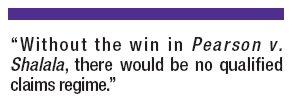 er more than one generation away from extinction. We didn’t pass it to our children in the bloodstream. It must be fought for, protected and handed on for them to do the same, or one day, we will spend our sunset years telling our children and our children’s children what it was once like in the United States where men were free.”
er more than one generation away from extinction. We didn’t pass it to our children in the bloodstream. It must be fought for, protected and handed on for them to do the same, or one day, we will spend our sunset years telling our children and our children’s children what it was once like in the United States where men were free.”
Unqualified health claims are the creature of statute, the Nutrition Labeling and Education Act (NLEA) of 1990, 21 USC 342(r)(5)(b). The NLEA provision required FDA to articulate a standard for review of unqualified health claims. By express language of the statute, the standard for dietary supplements was not to be the same as the standard for foods. The standard specified for foods in the statute, significant scientific agreement, was largely an assembly of words having no certain meaning, begging for a more concrete agency definition. FDA, however, was required by statute to come up with a standard other than significant scientific agreement (SSA) for dietary supplements. In violation of that statutory requirement, FDA declared through rulemaking that it would evaluate claims for dietary supplements under the same standard for foods, SSA, and then refused to give SSA any clear definition.
In rulemakings in which my clients, including Durk Pearson and Sandy Shaw and the American Preventive Medical Association (APMA, now ANH-USA), were participants, we argued to FDA that it was obliged to explain what it meant by SSA in a manner comprehensible to the regulated class and should do so in a way that would not cause the standard to censor information that the First Amendment required to be allowed. We argued, in the alternative, that if FDA defined “significant scientific agreement” in a way that would cause science protected by the First Amendment to be suppressed that the agency would have to allow the claims it did not approve to reach the public, relying on the less speech-restrictive alternative of claim qualifications. FDA rejected those arguments, even contending that it was not bound by the strictures of the First Amendment.
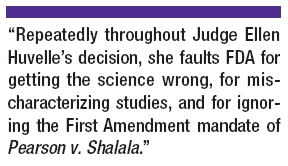 We sued the agency on First Amendment and Administrative Procedure Act grounds and that led to the landmark Pearson v. Shalala victory over FDA censorship in 1999. Pearson v. Shalala, not anything in the statute, created the qualified claims regime. The Court did so as a matter of constitutional law. FDA wanted the Solicitor General of the United States to appeal that decision to the Supreme Court. The Solicitor General refused, and the decision became final and binding upon the agency.
We sued the agency on First Amendment and Administrative Procedure Act grounds and that led to the landmark Pearson v. Shalala victory over FDA censorship in 1999. Pearson v. Shalala, not anything in the statute, created the qualified claims regime. The Court did so as a matter of constitutional law. FDA wanted the Solicitor General of the United States to appeal that decision to the Supreme Court. The Solicitor General refused, and the decision became final and binding upon the agency.
Many people do not realize this, but Pearson v. Shalala stands for the proposition that claims not approved by FDA must nevertheless be allowed to enter the market unless FDA can prove with empirical evidence that no qualification of the claims exists that can render them non-misleading. That is a very high burden of proof for FDA to meet. If followed (something FDA has consistently and contumaciously refused to do), the First Amendment thus ensures that disclosure of scientific information is the operative rule and suppression the rare exception.
This, then, was a First Amendment revolution that imposed a major legal limit on the discretion of FDA speech police. Claims not approved by FDA could not be suppressed by the agency, but would have to be allowed with reasonable disclaimers. The Court held that for such claims (for folic acid reducing neural tube defects; antioxidant vitamins reducing cancer; omega-3 fatty acids reducing coronary heart disease; and fiber reducing colorectal cancer), FDA could require qualifications revealing (1) that FDA did not approve the claims and (2) that the scientific evidence supporting them was inconclusive.
So, without the win in Pearson v. Shalala, there would be no qualified claims regime. That case, and not anything in the statute, forces FDA to allow claims it disapproves qualified to so state and to inform the public of the unremarkable fact that scientific evidence in support of the claim is inconclusive. I say unremarkable because nearly every nutrient- disease association is the subject of scientific debate. Indeed, it is a rare event for anything in science to be deemed conclusive; science, by nature, is evolutionary, dynamic and not static; and so is nutrition science.
I should add that Pearson v. Shalala and its progeny reaffirm individual sovereignty over the power of the state. They stand for the proposition that consumers have an inalienable right to decide for themselves the relative worth of scientific speech in the market and that government may not deny consumers access to science on the paternalistic notion that the government knows better than the individual consumer what is in that consumer’s best interest. It is a major reaffirmation of constitutional limits on censorship in an area that affects every American (the market for foods and supplements).
Passwater: Weren’t the first selenium qualified health claims approved in 2003 because of your petition? These FDA-approved qualified health claims allowed the following to be published on labels and advertisements:
1)”Selenium may reduce the risk of certain cancers. Some scientific evidence suggests that consumption of selenium may reduce the risk of certain forms of cancer. However, FDA has determined that this evidence is limited and not conclusive.” And:
2) “Selenium may produce anticarcinogenic effects in the body. Some scientific evidence suggests that consumption of selenium may produce anticarcinogenic effects in the body. However, FDA has determined that this evidence is limited and not conclusive.”
Emord: Yes. We petitioned FDA for those claims and they were allowed by the agency in response to the petition with the qualifications you quote. In 2009, FDA unilaterally reversed its decision to allow those claims, condemning them all over again. We sued to obtain approval for site-specific selenium–cancer risk reduction claims. There would be no claims for selenium and cancer were it not for that petition, and there would be none now available but for the decision of Judge Huvelle in ANH v. Sebelius.
Passwater: Were you successful in obtaining other health claims and qualified health claims?
Emord: Yes. There have been several over the years and most have been achieved only after suing the agency for refusing to allow them: (1) Folic acid and a reduction in the risk of neural tube defects; (2) Antioxidant vitamins C and E and cancer risk reduction (now the subject of a suit to reestablish the right to make antioxidant–site-specific claims in light of a unilateral decision last year by FDA to deny them yet again [the third such action by FDA against the ruling in Pearson v. Shalala]); (3) B6, B12, folic acid and a reduction in the risk of vascular disease; (4) Omega-3 fatty acids and a reduction in the risk of coronary heart disease; (5) Chromium picolinate and a reduction in the risk of insulin resistance and type-2 diabetes; and (6) Phosphatidylserine and a reduction in the risk of cognitive dysfunction and dementia.
Passwater: It is widely known that FDA doesn’t like health claims. Wasn’t the notice they published in the Federal Register in December 2007 an indication that they were looking to eliminate or reduce qualified health claims by a biased “review process.”
Emord: Yes. FDA intended to revert to a singular method of review under its still inadequately defined significant scientific agreement standard; thus, it directly announced its decision to violate the constitutional mandate our federal courts have imposed on the agency by condemning all claims except those that it deemed proven to a conclusive degree. ANH v. Sebelius made clear that FDA has no constitutional power to pursue that retrograde direction; rather, Pearson v. Shalala still controls.
Passwater: Dr. Gerhard Schrauzer and I, each independently, but through your good offices, wrote scientific reports on the science supporting the claims, supportive of the arguments you made that FDA violated the constitutional standard (FDA Document No. 2007N-0464). Wasn’t the June 19, 2009 FDA response to your February 16, 2008 petition another indication that FDA was attempting to eliminate qualified health claims or make the use of health claims impractical? FDA then completely denied qualified health claims for selenium and brain, breast, liver, lung, respiratory tract, urinary tract and digestive tract cancers.
The ones they did approve for prostate, bladder and thyroid cancers read so poorly that they were useless. Here is an example of the claim they allowed for selenium and prostate cancer. “Two weak studies suggest that selenium intake may reduce the risk of prostate cancer. However, four stronger studies and three weak studies showed no reduction in risk. Based on these studies, FDA concludes that it is highly unlikely that selenium supplements reduce the risk of prostate cancer.”
FDA shamefully used the tactic of arbitrarily rejecting favorable studies and relying on grossly flawed studies. The agency was clearly wrong in its evaluation of the studies, so we had to sue so that all of the evidence would be considered including several more clinical studies, hundreds of animal studies and human epidemiological studies and thousands of mechanistic studies. In my scientific response of February 18, 2008, I had included 95 references detailing many of these studies.
Emord: The agency neither cited nor followed the First Amendment standard that it is required to use in addressing qualified claims. It contumaciously disregarded the governing constitutional law in a rush to suppress claims that the First Amendment requires be allowed.
Passwater: The new qualified health claims cover more cancers and are succinct enough to use on labels. As an example, so far, you and FDA have agreed on the following:
1) Selenium may reduce the risk of prostate cancer. Scientific evidence concerning this claim is inconclusive. Based on its review, FDA does not agree that selenium may reduce the risk of prostate cancer.
2) Selenium may reduce the risk of colon cancer. Scientific evidence concerning this claim is inconclusive. Based on its review, FDA does not agree that selenium may reduce the risk of colon cancer.
3) Selenium may reduce the risk of bladder, colon, prostate and thyroid cancers. Scientific evidence concerning this claim is inconclusive. Based on its review, FDA does not agree that selenium may reduce the risk of these cancers.
As we speak, you are still negotiating the qualified health claims for selenium and lung and respiratory tract cancers and selenium and digestive tract cancers.
So far, the new qualified health claims extend selenium’s anti-cancer effect to six specific cancers and we should get approval for three more specific cancers. Why would anyone consider these new qualified health claims agreed to by FDA no better for consumers than the ones that FDA was going to adopt as it outlined in the July 2009 letter to you?
Emord: Perhaps because the person is unaware of consumer survey evidence on qualified claims and unaware of the First Amendment precedent. Two consumer surveys, one by FDA and one by the Federal Trade Commission, established what may appear at first blush to be counterintuitive—consumers find more credible qualified claims than unqualified ones. Consumers are more apt to believe a claim that bears an FDA qualification (even a draconian qualification) than they are a claim that bears no qualification at all.
I suspect that this evidence proves consumers of dietary supplements are as savvy as I have long suspected them to be. They start with skepticism about industry claims. Thus, they generally take a claim that bears no qualification with a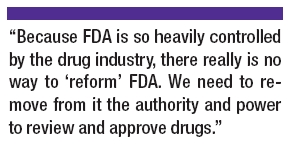 grain of salt. A claim that bears a qualification, however, does not lead them to conclude that the claim is unreliable. Rather, they give it more credence than if it were unqualified, apparently out of recognition that it has undergone FDA review. That being said, I believe supplement consumers are wise concerning FDA’s own biases (appreciating that FDA is predisposed against supplements as the Congress in the DSHEA legislative history so found). The Pearson v. Shalala court recommended that FDA use two kinds of disclaimers: one revealing the fact that FDA does not approve the claim (true of all qualified claims) and another revealing that the scientific evidence in support of the claim is inconclusive (true of nearly all nutrient–disease relationships).
grain of salt. A claim that bears a qualification, however, does not lead them to conclude that the claim is unreliable. Rather, they give it more credence than if it were unqualified, apparently out of recognition that it has undergone FDA review. That being said, I believe supplement consumers are wise concerning FDA’s own biases (appreciating that FDA is predisposed against supplements as the Congress in the DSHEA legislative history so found). The Pearson v. Shalala court recommended that FDA use two kinds of disclaimers: one revealing the fact that FDA does not approve the claim (true of all qualified claims) and another revealing that the scientific evidence in support of the claim is inconclusive (true of nearly all nutrient–disease relationships).
In the claim settlement reached on several of the selenium claims, the government agreed to limit its qualifications to those identified in Pearson v. Shalala. The government qualified the site-specific claims in two ways. First by stating the ubiquitous verité of supplement science (that the scientific evidence in support of the claim is inconclusive) and second by presenting the equally unremarkable opinion of FDA (inherent in every qualified claim approval) that it does not agree with the claim. This is the shortest qualification ever achieved. It is also an advance over a qualification that FDA does not approve the claim because instead it reveals FDA’s “opinion” that it does not agree with the claim. I suspect that opinion—one well understood by supplement consumers— to be but an opinion, not a fact and not dispositive.
Passwater: When it was announced that you were suing FDA over its response to our petition on selenium qualified health claims, an industry observer was quoted as saying, “The action had ‘next to no chance’ of succeeding” (2). How many times have you now defeated FDA in federal court?
Emord: Seven times, six on First Amendment grounds, and in each instance, seasoned FDA lawyers predicted we would lose. Twenty-six years of litigating in the federal courts has taught me that it is almost impossible to predict how a judge will decide a case, so when asked to make such predictions by the media I always decline.
Passwater: Perhaps, FDA lawyers conventionally focus on helping their clients follow FDA arbitrary regulations rather than constitutional law. It is cheaper for the clients to go along with FDA illegal actions than to fight for their constitutional rights. Did FDA abide by the Court orders in the previous cases?
Emord: No. In fact, an FDA official told me about a year after the landmark Pearson v. Shalala (1999) decision issued that FDA would “never ever, ever” abide by that order. When I heard the official say those words, a very cold and stark reality came upon me. FDA views itself above the law. There can be no rule of law, no protection for civil liberties, and no limits on government power when an agency of the federal government is lawless, and FDA has proven itself lawless repeatedly. As it turns out, tragically, that official was right. FDA has never adhered to the letter or spirit of that landmark decision. That was a final and binding constitutional mandate on the agency, yet FDA refuses to follow the requirement that it favor disclosure of health information over suppression as its operative rule. It does the opposite. It favors suppression as the rule and disclosure as the rare exception.
One of the Pearson v. Shalala health claims we fought for concerned folic acid reducing the risk of neural tube defect births. FDA censored that information for four years prior to the decision, contributing to an estimated 2,500 preventable neural tube defect births and countless neural tube defect-related abortions each year the censorship remained in place (some six years). After Pearson was decided, we had to return to court when after three more years the FDA’s ban remained in place in contumacious disregard of the Court of Appeals’ order. The district court enjoined FDA’s ban and finally freed the claim. Since that time, survey evidence from the National Institute of Health and the Centers for Disease Control and Prevention has confirmed a precipitous drop in the incidence of neural tube defect births in America, due in no small measure to the fact that women of childbearing age now understand directly in the market (not from their obstetricians after becoming pregnant) the prudence of consuming 800 mcgs of folic acid in a dietary supplement before they become pregnant as an essential means to reduce the risk of neural tube defects by as much as 80%.
Passwater: As mentioned earlier, on May 24, 2010, Judge Huvelle of the U.S. District Court for the District of Columbia handed you your seventh victory over the FDA. What is the crux of her decision?
Emord: Judge Huvelle’s decision is brilliant, clearly written, containing thoughtful analysis and guidance. She held FDA’s censorship of seleniumsite specific cancer risk reduction claims unconstitutional under the First Amendment. She also held FDA’s draconian disclaimer on one of the claims that it permitted (concerning selenium reducing the risk of prostate cancer) patently unreasonable and explained in greater detail the limits on FDA’s power to qualify claims under the First Amendment. This is now a final and binding order on FDA because the agency chose not to appeal the decision. I think, however, if history is our guide, FDA will ignore this decision as well. FDA had brazenly argued that it ought not be required to comply with the First Amendment commercial speech standard that the courts have imposed on it in six prior decisions.
It also argued that the Judge should defer to its evaluation of science and its conclusions without serious inquiry. Judge Huvelle ruled that the First Amendment applies to FDA; that Pearson v. Shalala is the governing law; and that FDA has no option but to comply with that standard. She also ruled that while FDA may review science and pronounce its opinion concerning it, the agency will be subject to de novo judicial review when it is sued on First Amendment grounds, thus denying FDA the total deference it has unsuccessfully demanded since 1999.
There is one crucial part of the decision that applies the First Amendment, for the first time, to FDA’s choice of qualification for a claim. Judge Huvelle refused to defer to FDA on the content of its qualifications for claims. She ruled that FDA could not draft claim qualifications that contradicted petitioned claims, could not require use of inaccurate qualifications, and could not rely on verbose qualifications. That reaffirmed Judge Gladys Kessler’s earlier decisions demanding that FDA rely on “succinct and accurate” disclaimers but expounded on the requirement, further limiting FDA discretion in ways commanded by the First Amendment. She found that FDA’s qualification for the selenium-prostate cancer risk reduction claim falsely represented the science and unconstitutionally contradicted, rather than qualified, the claim. Repeatedly throughout her decision, she faults FDA for getting the science wrong, for mischaracterizing studies, and for ignoring the First Amendment mandate of Pearson v. Shalala. It is an excoriating tour de force against the agency’s abusive practices. It is in circumstances such as this that I rejoice in our First Amendment and am so very grateful for wise and able judicial talents. This is why I entered the law in the first place, to advance the cause of liberty.
Passwater: Are you satisfied with how FDA has abided by the recent decision?
Emord: I am pleased that FDA reached settlement with us on several of the selenium–cancer site-specific claims and wish for an accord on the remaining ones. I am respectful of the talented lawyers at FDA and in the Department of Justice who have risen to the occasion to make the settlement possible. As for the remaining claims, we will not settle if any of the qualifications exceed those permitted under Pearson v. Shalala and ANH v. Sebelius. We will settle if the qualifications fit within those cases. We have seen FDA wax and wane on claim qualifications, preferring after a court decision requiring resolution in a constitutional direction, to return to unconstitutional suppression.
I suspect that pattern will continue. If it does, I will be forced to pursue a contempt action against the FDA Commissioner and the Director of the Center for Food Safety and Applied Nutrition. The agency’s leaders must come to appreciate that neither they nor the agency as a whole are above the law. When agents of the government go rogue and violate the Constitution over and over again, there is only one option for those whose rights are being violated and that is to seek to hold the individuals in those offices directly accountable. The law permits them to be held accountable and to pay as a penalty the attorney fees of the party seeking contempt. There are certain steps that must occur before that end is reached, but I am long past tired of witnessing people in government break the law and not account for the violations. It’s high time those folks were held accountable for their lawlessness.
Passwater: There is another case pending on antioxidant vitamins and cancer risk reduction. What will become of that one?
Emord: As I suggested earlier, only a fool predicts the outcome of a case in litigation. It is not prudent to guess the thinking of a federal judge. I do know that if the law is followed, the decision should go our way. The antioxidant vitamin–cancer risk reduction claim was held unconstitutionally suppressed in two of our earlier victories over FDA—in Pearson v. Shalala I and in Whitaker v. Thompson I. In that latter decision the court enjoined FDA from censoring the claim. FDA violated that injunction by censoring it a third time without leave of court. It has not followed the constitutional requirements of Pearson v. Shalala I in censoring the claim. In fact, in this case, FDA has asked the district court to do something it cannot do legally: overrule Pearson v. Shalala I.
I earnestly hope that the court will reaffirm Pearson v. Shalala I and hold FDA’s third attempt at censorship of the claims unconstitutional. Its censorship of the antioxidant vitamin–cancer risk reduction claims is not only contrary to basic science, it is contumacious conduct in violation of two prior final and binding court orders on the antioxidant vitamin/cancer risk reduction relationship. In both of those cases, the Courts found credible scientific evidence supporting the claims and held FDA to have violated the First Amendment by censoring them without resort to reasonable qualifications regarding the inconclusiveness of the science.
Passwater: How do you answer those who say that the public should only be allowed to receive the science FDA deems conclusive because inconclusive science confuses consumers and may mislead them?
Emord: That is precisely FDA’s position and the position rejected by our Court of Appeals and each district court thereafter. The notion is highly paternalistic and offensive to a free people. Under our First Amendment, government is obliged to trust in the judgment of the individual in determining the relative worth of speech offerings. As you know, rarely is anything in science ever deemed conclusive by scientists. Indeed, debate still surrounds whether folic acid alone or in combination with other B-vitamins and nutrients is ultimately responsible for a neural tube defect risk reduction. Were FDA’s argument the law, the folic acid claim would still be censored and women of childbearing age would still be suffering neural tube defect births and related abortions at the rates common before our courts compelled FDA to let that information into the market.
The point is simple. The Constitution protects consumer access to inconclusive science as well as to conclusive science. It trusts in the freedom of the individual to choose the extent to which he or she wishes to rely on inconclusive information in making a purchase. That is our common experience as a free people. When we enter the market, we rely on a plethora of information that, in the end, is almost always inconclusive, as a basis to make life-affecting decisions. We rely on information from auto makers concerning the potential effectiveness of restraining devices, car seats and auto design in protecting us in accidents, yet that information is not backed by conclusive science. Everything from our purchase of a vacuum cleaner to our purchase of a particular brand of peanut butter is predicated on a series of assumptions about the relative safety and effectiveness of the products, none of which is based on conclusive science. In other words, almost everything we know about items we purchase is based on less than conclusive information. Inconclusive information is, however, essential to us. When we buy a vitamin we need to know of credible science linking it to an effect on health and disease. If that information is inconclusive, we need to know that as well.
For government to deny us credible science on the notion that political appointees think it insufficiently proven to justify our receiving it is antithetical to the core values protected by our First Amendment. Government may not decide for us. We are sovereign under the constitutional plan. Government may not presume to deny us access to information on the notion that we will place greater faith in it than FDA speech police think wise. As a free people, we are entitled to bet on the likelihood that credible evidence will be proven ultimately true some day. When government censors credible evidence because it has not yet been proven conclusively true to FDA’s satisfaction, it is, in fact, making the ultimate decision for us that cannot be so made if we are to retain our sovereignty, our freedom.
For all we know, this inconclusive information FDA so disparately seeks to keep from us may one day prove true and, in the interim, those denied it will have experienced the harms that the products could have prevented. If omega-3s prevent sudden death heart attacks, the ban on that claim is now condoning about 110,000 sudden death heart attacks a year. If co-enzyme Q10 reduces the incidence of congestive heart failure, the ban on that claim is now contributing to the premature deaths of thousands each year. If glucosamine and chondroitin sulfate repair and rebuild cartilage in those suffering from osteoporosis and help reduce the risk of osteoporosis, the ban on that claim is now contributing to the progression of that painful disease in hundreds of thousands of Americans.
We cannot afford to rely on government to dictate a health orthodoxy precisely because government is not omniscient (indeed, it is wrong frequently) and precisely because government decisions are ultimately political, not scientific, and proceed from a bias (most often in favor of protecting its favored regulatee, the pharmaceutical industry, from competition).
Passwater: I understand that your books The Rise of Tyranny (Sentinel Press, 2008) and Global Censorship of Health Information (Sentinel Press, 2010) became Amazon.com best sellers (and are available through this vendor). Please tell us about those books.
Emord: In The Rise of Tyranny (available through Amazon.com), I explain in detail how FDA has become a captive of the drug industry; how the FDA Commissioner has repeatedly approved drugs over the safety objections of FDA medical reviewers to the grave detriment of people worldwide; and how the agency has kept unsafe drugs on the market to protect the financial interests of drug companies over the health and lives of people. I explain that this is a product of a basic violation of the Constitution, of the non-delegation doctrine now a part of what Judge Douglas Ginsburg has called “our Constitution in exile.” FDA possesses combined legislative, executive and judicial powers, which has enabled it to be all-powerful in its sphere. It is tyrannical, as a result. It regards itself as not beholden to the courts, the Congress or the American people. It is a rogue agency whose political appointees pursue their own self-interest by favoring certain regulatees (drug companies) to enhance their prospects of post-government employment. It is a very corrupt agency.
In Global Censorship of Health Information (also available through Amazon.com), I explain how every government that regulates drugs does so by giving the drug industry a monopoly on the right to communicate therapeutic information. The effect is to censor from world markets truthful information concerning the therapeutic effects of foods and nutrients—all to protect the financial interests of the drug industry. This anti-competitive monolith in the law contradicts Euro-American legal traditions having their origins in the Enlightenment Era, favoring protection of freedom of speech and individual liberty. The book explains this conflict and advocates legal changes to bring down censorship and free the market to truthful, health-enhancing and life-saving information.
Passwater: What can we do to end FDA censorship and FDA approval of unsafe drugs?
Emord: To end FDA censorship, we must pass a bill I wrote for Congressman Ron Paul called the Health Freedom Act, HR 3395, that would disarm FDA of its prior restraint on health claims, preventing the agency from exercising a pre-market review of food and dietary supplement health claims. The bill would end FDA’s prior restraint on health claims, but would not deny the government the power to prosecute those who make claims the government can prove by clear and convincing evidence to be false.
Because FDA is so heavily controlled by the drug industry, there really is no way to “reform” FDA. We need to remove from it the authority and power to review and approve drugs. Instead, we need to create by statute a new system that would give university departments that meet certain statutory requirements and have no conflicts of interest the opportunity to serve as drug application review centers. Under the system I contemplate, drug companies would file applications for drug approval with the Department of Justice. This department would review the applications to remove all mention of the company and to assign in secret and at random a drug application to a testing center for review. That center would not only review the application, it would also conduct clinical trials to determine safety and efficacy. At the conclusion of the evaluation, it would publish its results. Only then would the world know which center evaluated which drug and what the results were.
The determination would be presumptively the law. A disgruntled drug company could sue, but the only relief would be the right to have the product reevaluated by a different testing center in secret. It would be a felony for a drug company to attempt to influence a testing center’s evaluation or for a testing center’s employees to communicate with or work for a drug company sponsor.
The law would also require that the identity of each testing center to remain secret so as to avoid the drug company sponsor knowing which center had its drug. The centers and the personnel working for them would be forbidden from receiving any money directly or indirectly from the drug industry and would be forbidden from working for drug companies in future as conditions precedent to their selection.
Only a system of this kind will end the corruption now common in this process and restore the supremacy of science over politics in drug reviews. Rather than having one centralized, corrupt, government run drug approval process, there would be dozens of university-based clinical trial testing centers, insulated from outside influence and dedicated to finding honest answers about drug safety and efficacy. The American people are entitled to those honest answers and have not gotten them from FDA. We remain, as FDA Office of Drug Safety Associate Director David Graham so aptly stated, “vi r tual ly defenseless” against FDA approval of unsafe drugs. As Dr. Graham, FDA medical reviewer David Ross, and FDA medical reviewer Robert Misbin, among others, have said, FDA managers view the drug indus t ry as the agency’s “client” whose interests they must protect and advance, even at the expense of the health and lives  of the American people. That system must change and lasting solutions will come not from within the corrupt institution but from its dismantlement.
of the American people. That system must change and lasting solutions will come not from within the corrupt institution but from its dismantlement.
Ultimately, Congress must pass another bill I wrote for Congressman Paul called the Congressional Responsibility and Accountability Act, HR 3396. That bill would restore the separation of powers and defeat unconstitutional delegations of governing power that are responsible for the abuses of FDA and other regulatory commissions that function as bureaucratic oligarchies making almost all federal law the product not of our elected representatives. The bill prohibits any regulation from being enforced unless it is first passed into law by Congress in the way in which the Constitution designates. That simple measure would end the bureaucratic oligarchy that so regularly violates our rights and would restore our republic.
Passwater: Attorney Emord, once again we thank you both for taking the time to discuss these important issues with us, and more importantly, for all that you have done for consumers and the dietary supplement industry. WF
*Editor’s note: In the expanded quote, the interviewee states it is unclear how much impact the new health claim will have because “the qualifications remain so strong.”
References
1. S. Starling, “Court Order Prompts FDA Selenium Health Claim Change,” NutraIngredients, Oct. 4, 2010.
2. S. Starling, “FDA Sued Over ‘Unclear’ GMP Rules,” NutraIngredients, Aug. 12, 2009.
Dr. Richard Passwater is the author of more than 40 books and 500 articles on nutrition. He is the vice president of research and development for Solgar Vitamin and Herb. Dr. Passwater has been WholeFoods Magazine’s science editor and author of this column since 1984. More information is available on his Web site, www.drpasswater.com.
Published in WholeFoods Magazine, December 2010










